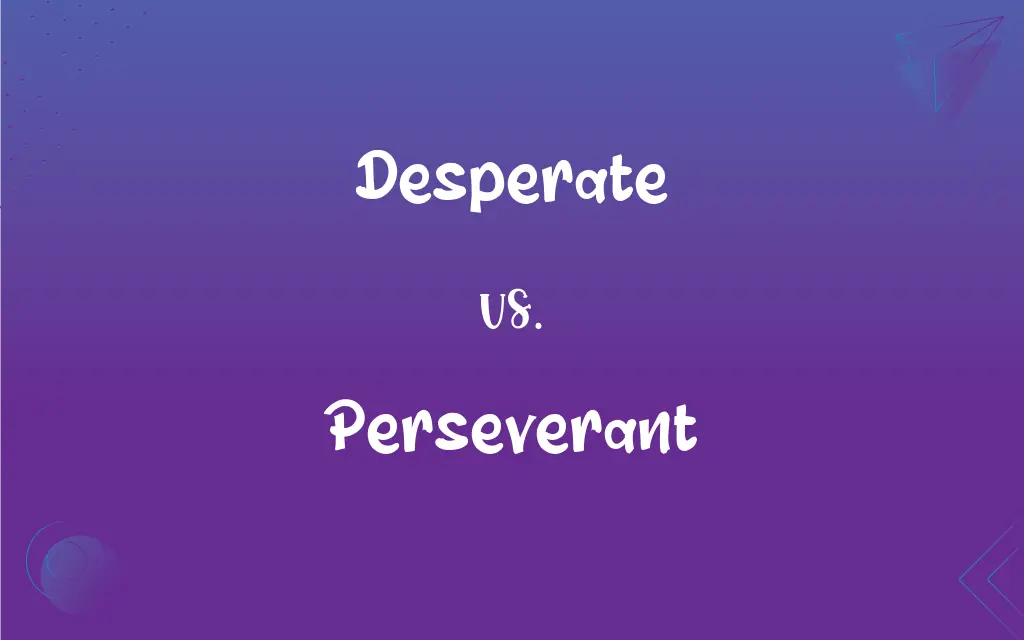Desperate vs. Perseverant: What's the Difference?
Edited by Aimie Carlson || By Janet White || Published on December 18, 2023
Desperate implies a sense of hopelessness and urgency, often leading to reckless actions; perseverant describes continuous, determined effort despite difficulties.

Key Differences
Desperate indicates a state of despair or urgency, often leading to hasty, irrational actions. Perseverant, in contrast, suggests a steady and persistent resolve, maintaining a course of action despite challenges.
In desperation, decisions are frequently impulsive, driven by immediate needs or extreme situations. Perseverance involves thoughtful, consistent efforts, often characterized by careful planning and resilience.
Desperate actions often aim for quick, immediate relief from a pressing problem, regardless of long-term consequences. Perseverance focuses on long-term goals, with an understanding that success requires time and sustained effort.
Desperation is commonly associated with dire situations lacking easy solutions, whereas perseverance is admired in scenarios requiring long-term commitment, such as career goals or personal development.
Desperation can be perceived negatively, as it implies a loss of control or hope. Perseverance, on the other hand, is generally viewed positively, reflecting strength of character and determination.
ADVERTISEMENT
Comparison Chart
Emotional Tone
Characterized by urgency and despair
Marked by steady determination and patience
Decision-Making
Often impulsive and reckless
Thoughtful, consistent, and resilient
Focus
Seeks immediate solutions, often short-sighted
Aimed at long-term goals, accepting of gradual progress
Typical Context
Arises in dire or extreme situations
Seen in challenging but manageable situations
General Perception
Can be perceived negatively
Generally viewed positively
ADVERTISEMENT
Desperate and Perseverant Definitions
Desperate
Feeling or showing a hopeless sense of urgency.
In a desperate attempt to save the business, he invested all his savings.
Perseverant
Persistent in pursuit of a goal despite difficulties.
The perseverant scientist continued his research despite setbacks.
Desperate
Reckless or dangerous because of despair.
The stranded hikers made a desperate call for help.
Perseverant
Continuously diligent and hard-working.
Her perseverant nature was evident in her meticulous approach to her projects.
Desperate
Having a great need or desire for something.
She was desperate to prove her innocence.
Perseverant
Not deterred by delays or obstacles.
He was perseverant in learning the new language, practicing daily.
Desperate
Involving extreme measures or risks.
The team's desperate strategy in the final minutes won them the game.
Perseverant
Showing continued steady determination.
Her perseverant efforts led to her success in the marathon.
Desperate
Indicating despair or a loss of hope.
His desperate expression revealed his inner turmoil.
Perseverant
Exhibiting steadfast endurance.
The perseverant athlete trained rigorously for years.
Desperate
Having lost all hope; despairing.
Perseverant
Enduring; persistent, resistant.
Perseverant
Persevering.
FAQs
Can a person be both desperate and perseverant?
Yes, one can start in desperation and evolve into adopting perseverant traits.
What makes someone desperate?
Extreme situations or urgent needs often lead to desperation.
What is the key trait of a perseverant person?
A perseverant person is characterized by persistent and steady determination.
Is desperation always related to negative outcomes?
Not always, but it often leads to risky decisions with uncertain outcomes.
How do desperation and perseverance differ in problem-solving?
Desperation may lead to hasty solutions, while perseverance involves methodical, patient problem-solving.
Can desperation be positive?
While often seen negatively, desperation can sometimes drive important breakthroughs.
Why is perseverance important in learning?
It helps in overcoming challenges and mastering complex subjects.
How do you handle desperation?
By seeking support, reassessing situations, and finding constructive solutions.
How do you develop perseverance?
By setting goals, practicing patience, and maintaining a positive attitude in the face of difficulties.
Is it good to be desperate?
While it can drive action, it's generally healthier to approach situations with calm and rationality.
Can desperation lead to innovation?
Sometimes, as urgency can spur creative solutions.
How does perseverance impact career success?
It leads to consistent effort and resilience, key to long-term success.
What differentiates a perseverant effort from a desperate one?
Perseverant efforts are steady and enduring, unlike the often erratic nature of desperate actions.
How is perseverance rewarded?
Perseverance often leads to achieving long-term goals and personal growth.
Can desperation be a motivational force?
In some cases, it can motivate immediate action.
What are the dangers of being desperate?
Desperation can lead to impulsive, potentially harmful decisions.
Can perseverance be learned?
Yes, through practice, experience, and a positive mindset.
Does desperation affect decision-making?
Yes, it often leads to rushed and less thought-out decisions.
How does society view perseverance?
Perseverance is widely admired and seen as a virtue.
What is a common outcome of desperation?
It often leads to short-term solutions that may not be sustainable or well-considered.
About Author
Written by
Janet WhiteJanet White has been an esteemed writer and blogger for Difference Wiki. Holding a Master's degree in Science and Medical Journalism from the prestigious Boston University, she has consistently demonstrated her expertise and passion for her field. When she's not immersed in her work, Janet relishes her time exercising, delving into a good book, and cherishing moments with friends and family.
Edited by
Aimie CarlsonAimie Carlson, holding a master's degree in English literature, is a fervent English language enthusiast. She lends her writing talents to Difference Wiki, a prominent website that specializes in comparisons, offering readers insightful analyses that both captivate and inform.







































































